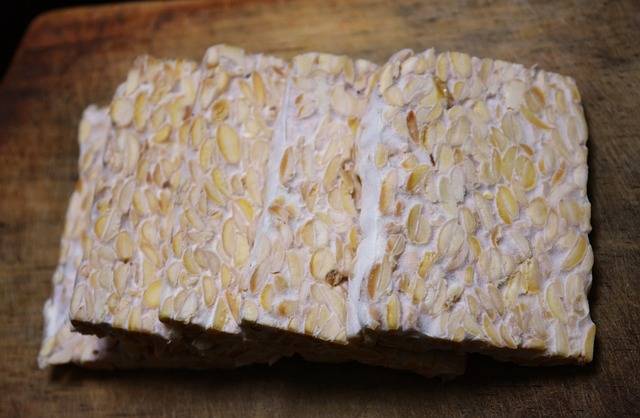Exploring Protein Sources Beyond Meat: Discovering the Power of Tempeh

In our quest for a healthy lifestyle, ensuring an adequate protein intake is crucial. While meat is a traditional source of protein, it's not the only option available. This article will shed light on alternative sources of protein and delve into the merits of incorporating tempeh into your diet.
Understanding Protein
Protein is an essential macronutrient responsible for numerous vital functions in our bodies. It plays a key role in building and repairing tissues, supporting muscle growth, and boosting overall health. Including protein in your daily meals is crucial for maintaining optimal wellness.
Benefits of Protein
Before exploring meat-free protein sources, let's understand the benefits of protein consumption. Protein helps regulate blood sugar levels, enhances satiety, and aids in weight management. It also promotes the development of enzymes, hormones, and antibodies, strengthening the immune system. Furthermore, protein assists in maintaining healthy hair, skin, and nails.
Meat-Free Protein
If you're looking to reduce your meat consumption or follow a vegetarian or vegan diet, there are plenty of alternative sources of protein available. One such source is tempeh, a nutritious plant-based protein that deserves special attention.
Tempeh: A Nutritional Powerhouse
Tempeh is a fermented soy product originating from Indonesia. This versatile food is a rich source of protein, containing all essential amino acids required by the human body. It also offers a range of vitamins and minerals, including iron, calcium, and B vitamins.
Unlike some meat substitutes, tempeh is minimally processed and retains much of its natural nutritional value. Its firm texture and nutty flavor make it a versatile ingredient that can be incorporated into various dishes.
Protein for Breakfast: A Kickstart to Your Day
Starting your day with a protein-packed breakfast is an excellent way to fuel your body and maintain energy levels throughout the morning. Including a good source of protein in your morning meal can help reduce cravings and prevent overeating later in the day.
There are several options for protein-rich breakfasts beyond the traditional bacon and eggs. Consider incorporating foods such as Greek yogurt, eggs, cottage cheese, chia seeds, and, of course, tempeh into your morning routine. These choices provide a nutrient boost while adding variety and flavor to your breakfast repertoire.
Natural Protein Sources: A Bounty from Nature
Nature offers an abundance of natural protein sources, both animal-based and plant-based. Including a diverse range of these sources in your diet can provide a well-rounded nutritional profile. Options such as:
Legumes and Pulses
Legumes and pulses are excellent plant-based sources of protein. They include beans, lentils, chickpeas, and peas. These nutritious legumes not only provide protein but also contain fiber, vitamins, and minerals. Incorporating legumes into your meals can offer a wholesome and satisfying protein boost.
Nuts and Seeds
Nuts and seeds are not only a great source of healthy fats but also pack a punch in terms of protein content. Almonds, walnuts, chia seeds, flaxseeds, and hemp seeds are just a few examples. Adding a handful of nuts or sprinkling seeds over your meals can contribute to your daily protein intake while providing added texture and flavor.
Quinoa
Quinoa is a versatile grain-like seed that is considered a complete protein source. It contains all essential amino acids, making it an ideal choice for individuals following a plant-based diet. Quinoa is easy to cook, pairs well with various ingredients, and can be used as a base for salads, bowls, or even as a substitute for rice.
Tofu and Edamame
Tofu and edamame are soy-based protein sources commonly used in vegetarian and vegan diets. Tofu, made from soy milk curds, is a versatile ingredient that can be grilled, sautéed, or blended into smoothies. Edamame, on the other hand, are young soybeans that can be enjoyed as a snack or added to salads, stir-fries, or soups.
Incorporating Protein into Daily Meals
Now that we've explored different sources of protein, it's important to understand how to incorporate them into your daily meals. Here are a few tips to help you make the most of these protein sources:
1. Plan your meals: Include a variety of protein-rich foods in your meal planning to ensure a balanced diet.
2. Experiment with recipes: Explore different recipes that incorporate protein sources, such as tempeh stir-fries, quinoa salads, or tofu scrambles.
3. Snack smartly: Opt for protein-rich snacks like roasted chickpeas, mixed nuts, or Greek yogurt with fruits.
4. Mix and match: Combine different protein sources in a single meal to enhance the amino acid profile and create exciting flavor combinations.
5. Be mindful of portion sizes: While protein is essential, it's important to consume it in appropriate portions to maintain overall dietary balance.
By implementing these strategies, you can create flavorful and nutritious meals that meet your protein requirements while keeping your taste buds satisfied.
Conclusion
Incorporating protein into your diet doesn't have to be limited to meat alone. Exploring alternative protein sources like tempeh, legumes, nuts, and seeds can provide a wide range of nutritional benefits. Whether you follow a vegetarian, vegan, or flexitarian lifestyle, these options offer diverse flavors and textures while meeting your protein needs. Embrace the power of tempeh and other meat-free protein sources to enhance your overall health and well-being.
Related Post:
The Incredible Health Benefits of Tempeh: Unlocking its Potential


